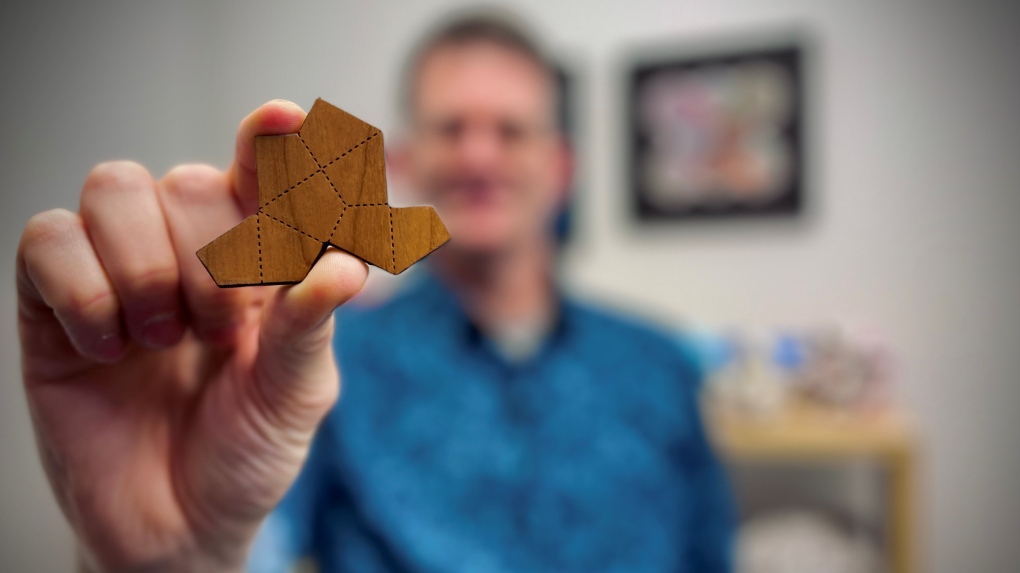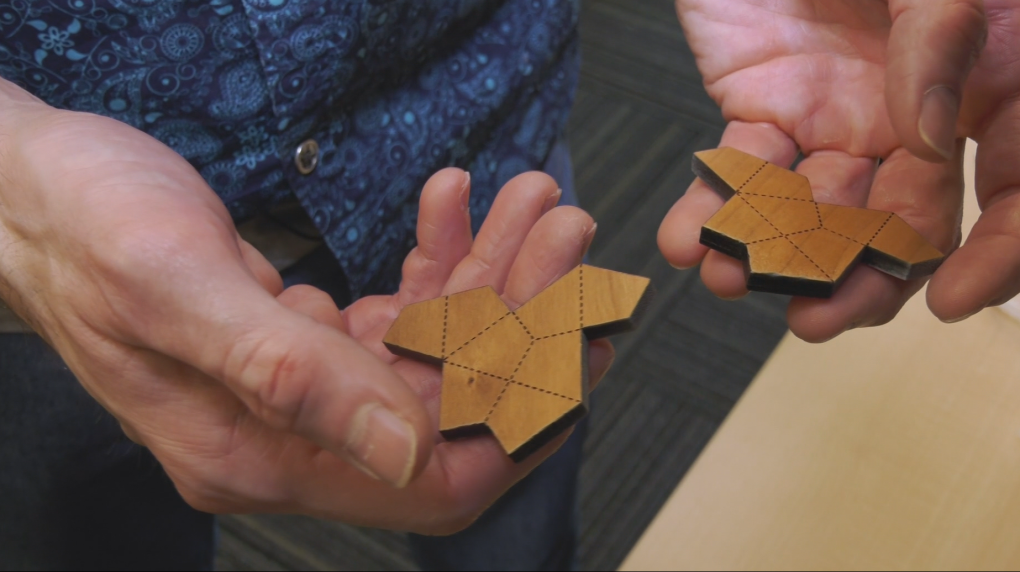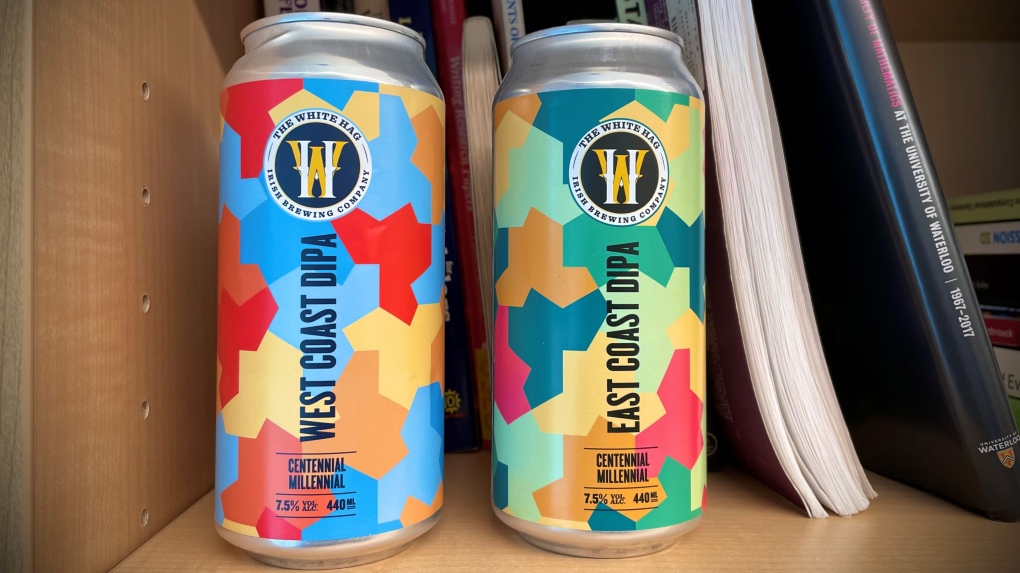New shape discovered by University of Waterloo scientist makes TIME's Best Inventions of 2023 list
A University of Waterloo scientist has made a discovery which has found its way onto TIME’s Best Inventions of 2023 list.
Craig Kaplan, an associate professor in computer science, helped discover an “einstein” – a longstanding mathematical problem deemed impossible for more than 60 years.
An einstein is a formation of shapes that perfectly interlocks with one another, without gaps or overlaps, like the bricks that assemble a house. In an einstein, the pattern of shapes never repeats.
Until recently, scientists had yet to discover a shape that could create such a pattern.
“The first stirrings of this problem in mathematics were in the early 1960s,” said Kaplan.
 Craig Kaplan holds "the hat." (Spencer Turcotte/CTV Kitchener)
Craig Kaplan holds "the hat." (Spencer Turcotte/CTV Kitchener)
In the math community, the concept is referred to as an aperiodic monotile. Mathematician Hao Wang put forward the belief in 1961 that such a shape did not exist. That notion remained until Kaplan and his international colleagues cracked the code.
“I chose the best possible route to achieve that, which is sit around and wait for someone to email you,” he joked.
That email came from David Smith, a retired printing technician in England. In it, Smith alerted Kaplan to the existence of “the hat,” called that because of its resemblance to a fedora.
 Craig Kaplan, at the University of Waterloo, helped discover an “einsten” – a formation of shapes that perfectly interlocks with one another. (Spencer Turcotte/CTV Kitchener)
Craig Kaplan, at the University of Waterloo, helped discover an “einsten” – a formation of shapes that perfectly interlocks with one another. (Spencer Turcotte/CTV Kitchener)
The hat has made noise around the world and it seems there could be practical applications of the shape on the horizon too.
“There’s been an incredible response from all kinds of hobbyists and artists and designers and craftspeople turning these into real world objects,” said Kaplan. “One example that I love is right here – this is a soccer ball,” he said, holding up the ball covered in the mysterious 13-sided shape.
 A brewing company in Dublin created these cans inspired by Kaplan’s discovery. (Spencer Turcotte/CTV Kitchener)
A brewing company in Dublin created these cans inspired by Kaplan’s discovery. (Spencer Turcotte/CTV Kitchener)
While Kaplan insists there is nothing magical about the discovery, he hopes it helps shape people’s mindset when approaching future problems that may seem impossible.
-- With files from CTV Toronto
CTVNews.ca Top Stories

Trudeau asked Trump for California, Vermont to curb annexation talks
Justin Trudeau says U.S. president-elect Donald Trump kicked the tires on the potential annexation of Canada during their recent meeting in Florida, but the topic was quickly dropped when the prime minister countered with a request for two states.
Man dies after falling into sink hole at Fernie Alpine Resort
An investigation is underway by Elk Valley RCMP after a man died Wednesday after falling into a sink hole at Fernie Alpine Resort.
One Alberta man gets jail, another community time for 2022 Coutts border protest
Two Alberta men have been sentenced for their roles in the illegal Coutts border blockade in 2022.
Liberal leadership: Carney expected to launch bid next week, Clark organizing heavily, Gould considers entering
While longtime cabinet ministers Dominic LeBlanc and Melanie Joly have officially announced they have no plans to run for the Liberal leadership, several well-known faces are organizing behind the scenes to launch bids of their own.
Amid tense backdrop, Canadian warship gets friendly message from Chinese vessel tracking movements
Daybreak on HMCS Ottawa began with a call over the marine radio from a Chinese warship. The call is coming from a Chinese Frigate known as the Yuncheng, the warship has been shadowing HMCS Ottawa through the South China Sea for two days and counting.
'Everything is gone': Sask. business owner loses Los Angeles home to wildfires
A Saskatchewan business owner lost her Los Angeles home as wildfires ravage parts of the city.
Trump gets no-penalty sentence in his hush money case, while calling it 'despicable'
U.S. president-elect Donald Trump was sentenced Friday to no punishment in his historic hush money case, a judgment that lets him return to the White House unencumbered by the threat of a jail term or a fine.
'Devastating beyond words': Paris Hilton shows remnants of home destroyed by L.A. fire
Socialite Paris Hilton shared a video showing her ravaged house, destroyed by the L.A. wildfires., 'I’m standing here in what used to be our home, and the heartbreak is truly indescribable,' Hilton wrote on Instagram.
School software hack hits school boards across six Canadian provinces
School boards across Canada are grappling with the fallout from a significant cyberattack on PowerSchool, a widely used administration software platform.

































